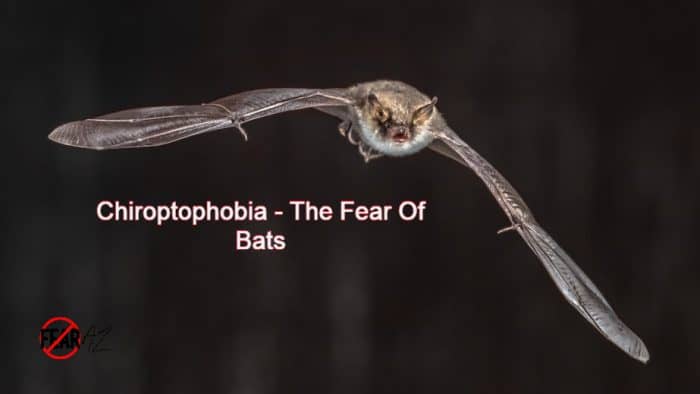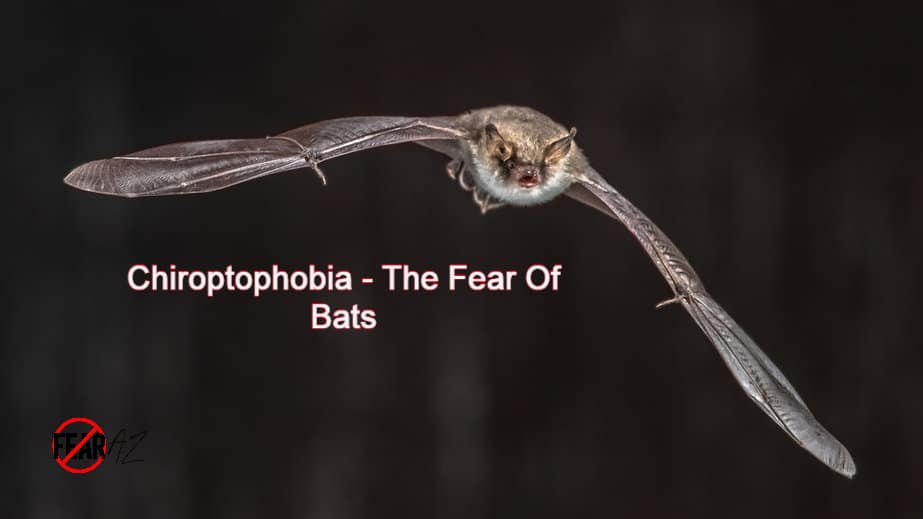Share This Article
The Phobia of Bats: An In-Depth Discussion
Are you scared of bats? Not just scared, but terrified? Do you shake and tremble when near bats?
What is the phobia of bats called?
Chiroptophobia is the technical term for fear of bats. You may suffer from an excessive fear or you may have an actual phobia of bats.
Chiroptophobia can cause horrible anxiety. It can induce panic attacks in the presence of bats. In extreme cases, the sounds, images, drawings of bats, or even just the mention of bats can trigger this phobia.
A Phobia or Fear or Disgust?
Remember: a phobia is not the same as a simple fear. It’s much stronger and can sometimes feel like a weight on your chest that you just can’t get off. It’s an overwhelming situation that can cause panic, disorientation with your surroundings, and many other symptoms.

Chiroptophobia Causes
In most cases, the fear of bats stems from misconceptions about bats, some of which may be based in superstition.
Did you know that in medieval Europe, it was considered a bad omen if a bat entered your house? It was believed this was a sign that someone in the family would die in the near future.
Today, movies and popular culture associate bats with darkness, Halloween, and vampires, which tend to paint rather gloomy images of bats.
Another possible cause of chiroptophobia, as is the case with most phobias, is a traumatic experience. You may have had an unpleasant encounter with a bat in the past. Although bat attacks are rare, they can act aggressively if they feel threatened or cornered. The phobia may also stem from a bad dream involving bats.
The Reality of Bats
Yes, bats can be unpleasant-looking creatures with their beady eyes, fangs, and leathery wings. Bats are also carriers of some serious diseases such as rabies. So it’s no wonder they’ve earned a bad reputation.
But did you know that about 70 percent of bats consume insects alone? This makes them insectivores, a subclass of carnivores. Some bats even limit themselves to fruits and nectar from flowers.
But regardless of diet, even vegetarian bats can have sharp canine fangs. And this can make bats look intimidating. However, in reality, they pose no threat to humans and often fly away if approached.
There are only three species of bats that feed on blood, and they all reside in Latin America. So unless you’re trekking through the tropics of central or South America, you don’t have to be concerned about bats.
Symptoms of Chiroptophobia
Fear causes a variety of symptoms. Depending on your reactions, you may find that you are simply disgusted by bats, rather than afraid of them. The way to tell concern or disgust apart from a phobia is by the symptoms you experience. If your concern or disgust is causing severe anxiety, physical palpitations, and/or breakdowns, you probably suffer from chiroptophobia.
Here is a list of the physical and psychological symptoms of chiroptophobia:
Physical Symptoms
- Feelings of dizziness
- Palpitations
- Stomach discomfort
- Dry mouth
- Excessive sweating
Psychological Symptoms
- Anxiety
- Inability to relax
- Panic attacks
How to Overcome the Fear of Bats?
First things first: a phobia is nothing to be ashamed of. It’s a completely natural occurrence. Most people suffer from some kind of phobia and are often completely unaware of it.
The good news about chiroptophobia is that it’s not a phobia that necessarily gets in the way of living a normal life. That is, of course, unless you live in an area with a dense population of bats.
However, if your phobia is making you squeamish at the thought of simply going out at night or exploring the wilderness, you should start working on overcoming your fear of bats.
Self-Help: What Are the Options?
Chiroptophobia is a relatively straightforward phobia to understand because it’s the fear of something specific rather than a concept like darkness or asymmetry. It’s usually rooted in misconceptions, superstitions, or traumatic past experiences involving bats.
To overcome your phobia, you can brush up a little on your knowledge of bats. Learn more about the different types, their temperaments, habitat, and lifestyle. You’ll be surprised to learn just how many similarities we share as mammalian species. People often fear what they don’t understand.
Knowledge can equip you to better respond to bats if you ever find yourself in a confrontational situation. Not that you should go looking for one. (And don’t ever try exposure therapy with chiroptophobia on your own.) But reading up about bat behavior can help you know how not to trigger their animal instincts and how to stand your ground. The more information you have, the less likelihood of you being afraid and the more confident you’ll be the next time you accidentally cross paths with a bat.
Professional Phobia of Bats Treatment
There are various options for clinical treatment of phobias. The most popular form of treatment for chiroptophobia is cognitive therapy.
This involves talking to a professional psychiatrist/therapist about the feelings you experience and your memories.
They assess you based on the information you provide and try to suggest what thinking or behavior patterns you need to change to overcome this fear. It’s a one-track approach and usually only requires four to ten sessions.
Another interesting treatment for chiroptophobia is hypnotherapy. It focuses on helping people find their inner strength and become independent. This approach tends to have a more holistic outcome since it helps you get rid of your fears by yourself. That is, the therapist helps you so that you’re mentally equipped to deal with fear in the long run.
Coping with Chiroptophobia in the Long Term
A question you may have at this point is why even bother to treat your intense fear of bats when you can just avoid bats? But it’s not just about making you stop fearing bats. Addressing your chiroptophobia will also help you to combat the irrationality of your fear. Learning how to overcome phobias is an important skill. It allows you to come out a stronger person, capable of maintaining composure in stressful situations.
Any irrational fear can get in the way of living a normal life. That’s why it’s necessary to learn to manage fear. The long-term plan for dealing with any phobia should involve professional treatment and practicing self-help methods.
Final Thoughts
If you’re planning to seek professional help with chiroptophobia, make sure your healthcare practitioner is well-reputed, licensed, and experienced. Chiroptophobia is a unique phobia, so it requires an experienced hand. If you’re in school, don’t hesitate to approach your counselor to talk about it. That’s what they’re there for.




